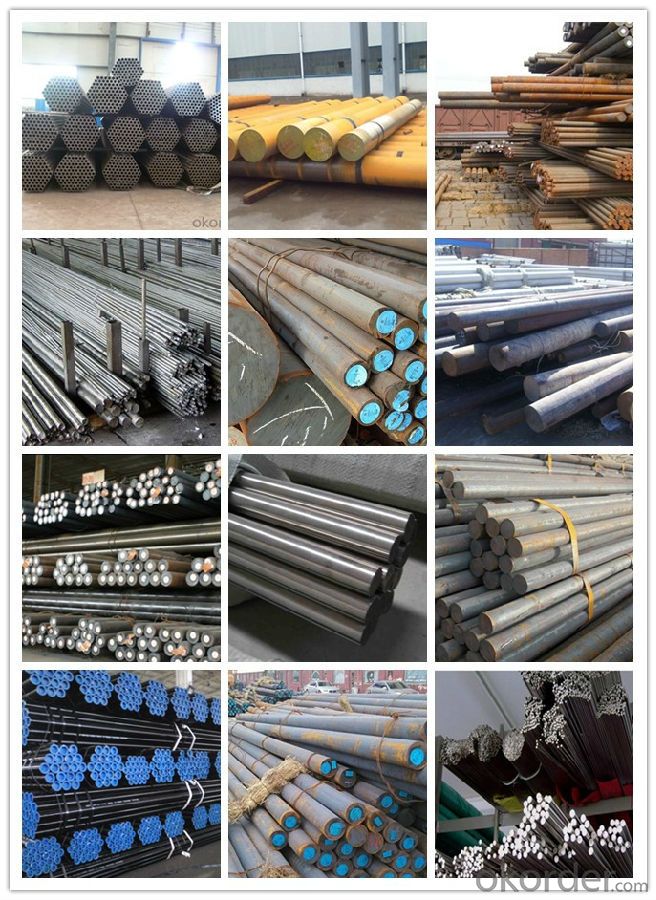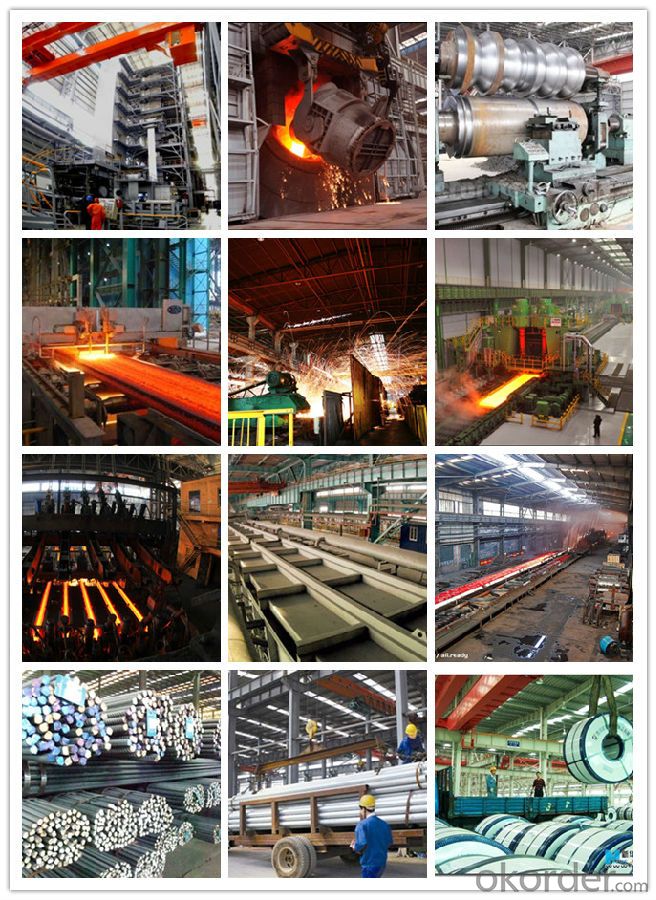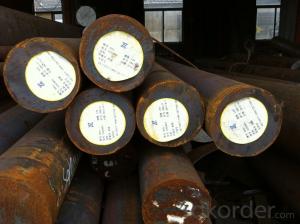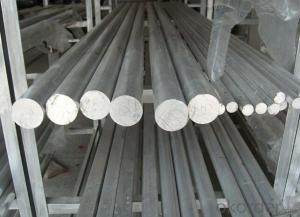Round Bar Alloy Tool Steel 42CrMo4 Special Steel
- Loading Port:
- China main port
- Payment Terms:
- TT OR LC
- Min Order Qty:
- 30 m.t.
- Supply Capability:
- 10000 m.t./month
OKorder Service Pledge
OKorder Financial Service
You Might Also Like
Item specifice
Characteristics
1) Even material.
2) Good machinability and polishability.
3) High toughness and high plasticity.
4) High abrasive resistance in high temperature.
5) Excellent total hardenability.
6) Low deformability during heat treatment.
7) Better isotropy.
Application
1) Diecasting mould(mold, fixed block, upper die, jet nozzle, nitride thimble ).
2) Extrusion die(mold, supporting member, choke blocks).
3) Hot press die. (aluminum, magnesium, copper alloy)
4) Parts, such as cold cutting, overlap, hot shears, wearable parts.
5) Important parts for aviation industry.
Product show

Workshop show

Shipping
1. FedEx/DHL/UPS/TNT for samples, Door-to-Door;
2. By Air or by Sea for batch goods, for FCL; Airport/ Port receiving;
3. Customers specifying freight forwarders or negotiable shipping methods!
Delivery Time: 3-7 days for samples; 5-25 days for batch goods.
Payment Terms
1.Payment: T/T, L/C, Western Union, MoneyGram,PayPal; 30% deposits; 70% balance before delivery.
2.MOQ: 1pcs
3.Warranty : 3 years
4.Package Informations: 1) EXPORT, In 20 feet (GW 25 ton) or 40 feet Container (GW 25 ton)
2)as customer's requirement
Main Product
Plastic Mould Steel
DIN 1.2311,1.2738,1.2083,1.2316 etc.
AISI P20,P20+Ni,420 etc.
JIS SUS420J2
Hot Work Steel
DIN 1.2344,1.2343,1.2367,1.2365,1.2581,1.2713 etc.
AISI H13,H11,H10,H21, etc.
JIS SKD61,SKD6,SKD5,SKT4 etc.
Cold Work Steel
DIN 1.2739, 1.2601, 1.2080, 1.2436, 1.2631, 1.263, 1.2510, 1.2327 etc.
AISI D2, D5, D3, D6, A8, A2, O1 etc.
JIS SKD10, SKD11, SKD1, SKS3 etc.
High Speed Steel
DIN 1.3343, 1.3243, 1.3247, 1.3355 etc.
AISI M2, M35, M42, T1 etc.
JIS SKH51, SKH35, SKH59, SKH2 etc.
Alloy Structural Steel
DIN 1.7035,1.6511,1.7220,1.7225 etc.
AISI 5140, 4340, 4135, 4140 etc.
JIS SCr440,SNCM439,SCM435,SCM440 etc.
Stainless & Carbon Steel or Others
DIN 1.4125,1.1191 etc
AISI 440C,1045, 1020 etc.
JIS SUS440C,S45C etc
Why choose us?
(1) The leading exporter in China special steel industry.
(2) Large stocks for various sizes, fast delivery date.
(3) Good business relationship with China famous factories.
(4) More than 7 years steel exporting experience.
(5) Good after-sales service guarantee.
- Q:What are the common challenges in heat treatment of special steel?
- To achieve the desired material properties, careful attention must be given to several challenges encountered in the heat treatment of special steel. One primary challenge revolves around the necessity for meticulous temperature control throughout the heating and cooling stages. Special steels typically have specific temperature ranges for heat treatment that must be strictly adhered to in order to attain the desired microstructure and mechanical properties. Failing to maintain precise temperature control can result in inadequate or inconsistent heat treatment, ultimately leading to suboptimal material performance. Another challenge lies in the potential distortion or warping of the steel components during the heat treatment process. Special steels often possess intricate designs or complex shapes, making them more susceptible to distortion when subjected to high temperatures. This distortion can have adverse effects on the overall quality and dimensional accuracy of the final product. Consequently, careful consideration must be given to the selection of suitable heating and cooling methods, as well as the utilization of fixtures or jigs to minimize distortion. Moreover, special steels may contain alloying elements that significantly influence the heat treatment process. Elements like chromium, molybdenum, or vanadium can alter the steel's hardenability, tempering response, or transformation behavior. Their presence can introduce additional challenges when determining the optimal heat treatment parameters, necessitating adjustments to heating and cooling rates, soak times, or quenching media. Lastly, achieving uniformity in heat treatment across a batch of special steel components can prove to be challenging. Variations in size, shape, or composition within a batch can result in inconsistent heat treatment outcomes. Controlling the heating and cooling rates, ensuring proper circulation of the heat treatment media, and implementing effective process monitoring techniques are essential in achieving consistent and uniform material properties. In conclusion, the heat treatment of special steel encompasses challenges such as precise temperature control, distortion/warping, the influence of alloying elements, and achieving uniformity across a batch. Successfully addressing these challenges requires a comprehensive understanding of the steel's composition, meticulous process planning, and the utilization of appropriate process controls and monitoring techniques.
- Q:How does special steel contribute to the durability of products?
- Special steel contributes to the durability of products in several ways. Firstly, special steel is known for its high strength and hardness, making it resistant to wear and tear. This ensures that products made from special steel can withstand heavy use and last longer than those made from regular steel or other materials. Additionally, special steel is often alloyed with other elements such as chromium, nickel, and molybdenum, which enhances its corrosion resistance. This is particularly important for products that are exposed to harsh environments or chemicals. The corrosion resistance of special steel helps prevent rust and degradation, increasing the lifespan of the product. Furthermore, special steel can be heat-treated to improve its mechanical properties, such as toughness and hardness. Heat-treated special steel undergoes specific heating and cooling processes to enhance its strength, making it less prone to deformation and breakage. This is particularly beneficial for products that are subject to heavy loads or impacts. Moreover, special steel is often manufactured with precise composition and microstructure, which results in improved material properties. This includes better fatigue resistance, meaning the material can withstand repeated stress without cracking or breaking. Products made from special steel are therefore more reliable and less prone to failure. In summary, special steel contributes to the durability of products through its high strength, corrosion resistance, improved mechanical properties, and better fatigue resistance. By utilizing special steel in the manufacturing process, products can be designed to withstand various demanding conditions, ensuring a longer lifespan and greater reliability.
- Q:How does special steel contribute to the automotive racing machinery industry?
- Special steel plays a crucial role in the automotive racing machinery industry by providing high-performance materials that enhance the performance, durability, and safety of racing vehicles. One of the primary contributions of special steel to the industry is its ability to improve the power and speed of racing cars. Special steel alloys, such as carbon fiber-reinforced steel or high-strength steel, offer superior strength-to-weight ratios, allowing manufacturers to reduce the weight of the vehicle while maintaining structural integrity. This reduction in weight enhances the acceleration and maneuverability of the racing car, resulting in increased speed and improved lap times on the track. In addition to improved performance, special steel also contributes to the safety of racing vehicles. The high strength and impact resistance properties of certain steel alloys make them ideal for constructing roll cages, chassis, and other critical safety components. These materials can withstand extreme forces during crashes or collisions, providing enhanced protection for the driver and minimizing the risk of severe injuries. Special steel also contributes to the longevity and durability of automotive racing machinery. The harsh conditions of racing, such as high temperatures, vibrations, and mechanical stress, can cause regular steel to deform or deteriorate quickly. However, special steel alloys are specifically engineered to withstand these demanding environments, ensuring that racing cars can endure the rigorous demands of the sport without compromising performance or safety. Furthermore, special steel alloys offer excellent thermal conductivity and heat resistance properties, which are essential for racing vehicles that generate immense heat during high-speed runs. By efficiently dissipating heat, special steel helps prevent overheating and ensures optimal engine performance, reducing the risk of mechanical failures and maximizing the lifespan of the racing machinery. In summary, special steel contributes significantly to the automotive racing machinery industry by enhancing the performance, durability, and safety of racing vehicles. The use of high-performance steel alloys helps increase speed, improve lap times, and reduce the weight of the vehicles. It also provides superior strength and impact resistance, enhancing safety during crashes or collisions. Moreover, special steel alloys offer excellent heat resistance and thermal conductivity, ensuring optimal engine performance and prolonging the lifespan of the racing machinery.
- Q:What are the properties of case-hardening steel?
- Case-hardening steel is a type of steel that possesses specific properties, such as high surface hardness and improved wear resistance. It achieves these properties through a process called case hardening, which involves heating the steel to a specific temperature and then introducing a carbon-rich environment. This process allows the steel to absorb carbon atoms, resulting in a hardened outer layer while maintaining a tough and ductile core. The hardened surface layer provides excellent resistance to abrasion and impact, making case-hardening steel suitable for applications requiring durability and strength, such as gears, shafts, and bearings.
- Q:How does special steel perform in high-stress corrosion cracking environments?
- Special steel is specifically designed to perform well in high-stress corrosion cracking environments. This type of steel is highly resistant to corrosion and can withstand the combination of stress and corrosive elements present in these environments. Its unique composition and manufacturing process make it more durable and less prone to cracking, ensuring its reliable performance in such challenging conditions.
- Q:What are the properties of alloy steel?
- Alloy steel is a type of steel that contains additional elements, such as chromium, nickel, or molybdenum, which enhance its mechanical properties. These alloys impart increased strength, hardness, and resistance to corrosion, making alloy steel suitable for various applications. It typically exhibits excellent toughness, durability, and wear resistance, making it ideal for use in construction, automotive, and machinery industries. Additionally, alloy steel can be easily heat treated, allowing for further customization of its properties to meet specific requirements.
- Q:What are the different forming techniques used for special steel?
- Some of the different forming techniques used for special steel include rolling, forging, extrusion, and casting.
- Q:How is maraging steel used in the production of aerospace components?
- Maraging steel is commonly used in the production of aerospace components due to its desirable properties such as high strength, toughness, and resistance to corrosion. It is used to manufacture various parts including landing gears, rocket motor casings, and turbine discs. Its unique combination of strength and ductility allows for the production of lightweight and durable components, ultimately enhancing the overall performance and safety of aerospace systems.
- Q:How does special steel contribute to the aerospace structural industry?
- Special steel plays a crucial role in the aerospace structural industry by offering exceptional strength, durability, and heat resistance. It is used extensively in the manufacturing of aircraft components such as landing gears, engine parts, and structural frames. The high tensile strength and corrosion resistance of special steel ensure the integrity and safety of the aircraft, enabling it to withstand extreme conditions and stress encountered during flight. Additionally, special steel's lightweight nature allows for increased fuel efficiency, reducing operational costs and environmental impact in the aerospace industry.
- Q:What are the requirements for special steel used in chemical processing?
- The requirements for special steel used in chemical processing are generally more stringent compared to regular steel due to the harsh and corrosive nature of the chemicals involved. Some of the key requirements for special steel in chemical processing include: 1. Corrosion resistance: Special steel used in chemical processing must exhibit high resistance to corrosion from acids, alkalis, and other corrosive chemicals. This is achieved by adding alloying elements such as chromium, nickel, and molybdenum, which form a protective oxide layer on the surface of the steel, preventing it from reacting with the chemicals. 2. High temperature resistance: Chemical processing often involves high-temperature reactions. Therefore, special steel used in this industry must have excellent heat resistance to maintain its strength and structural integrity at elevated temperatures. This is achieved by adding elements like chromium, nickel, and tungsten, which help in maintaining the stability of the steel at high temperatures. 3. Mechanical strength: Special steel used in chemical processing should possess sufficient mechanical strength to withstand the pressures and loads encountered in the process equipment. This requirement is met by adding alloying elements such as manganese, silicon, and carbon, which enhance the steel's strength and toughness. 4. Weldability: Weldability is a crucial requirement for special steel used in chemical processing as it allows for easy fabrication and installation of process equipment. Special steel with good weldability ensures strong and reliable joints, which are essential for the safe and efficient operation of chemical plants. 5. Resistance to stress corrosion cracking: Stress corrosion cracking is a significant concern in chemical processing environments. Therefore, special steel used in this industry should have good resistance to stress corrosion cracking, which is achieved by carefully selecting the alloying elements and controlling the material's microstructure. 6. Cleanliness: Special steel used in chemical processing should be free from impurities and have a low content of harmful elements that could contaminate the process or react with the chemicals. This necessitates strict quality control measures during steel production to ensure the desired cleanliness and purity. Meeting these requirements ensures that special steel used in chemical processing can withstand the aggressive chemical environment, high temperatures, and mechanical stresses encountered in the industry, leading to safe and reliable operation of the process equipment.
1. Manufacturer Overview |
|
|---|---|
| Location | |
| Year Established | |
| Annual Output Value | |
| Main Markets | |
| Company Certifications | |
2. Manufacturer Certificates |
|
|---|---|
| a) Certification Name | |
| Range | |
| Reference | |
| Validity Period | |
3. Manufacturer Capability |
|
|---|---|
| a)Trade Capacity | |
| Nearest Port | |
| Export Percentage | |
| No.of Employees in Trade Department | |
| Language Spoken: | |
| b)Factory Information | |
| Factory Size: | |
| No. of Production Lines | |
| Contract Manufacturing | |
| Product Price Range | |
Send your message to us
Round Bar Alloy Tool Steel 42CrMo4 Special Steel
- Loading Port:
- China main port
- Payment Terms:
- TT OR LC
- Min Order Qty:
- 30 m.t.
- Supply Capability:
- 10000 m.t./month
OKorder Service Pledge
OKorder Financial Service
Similar products
New products
Hot products
Hot Searches
Related keywords





























